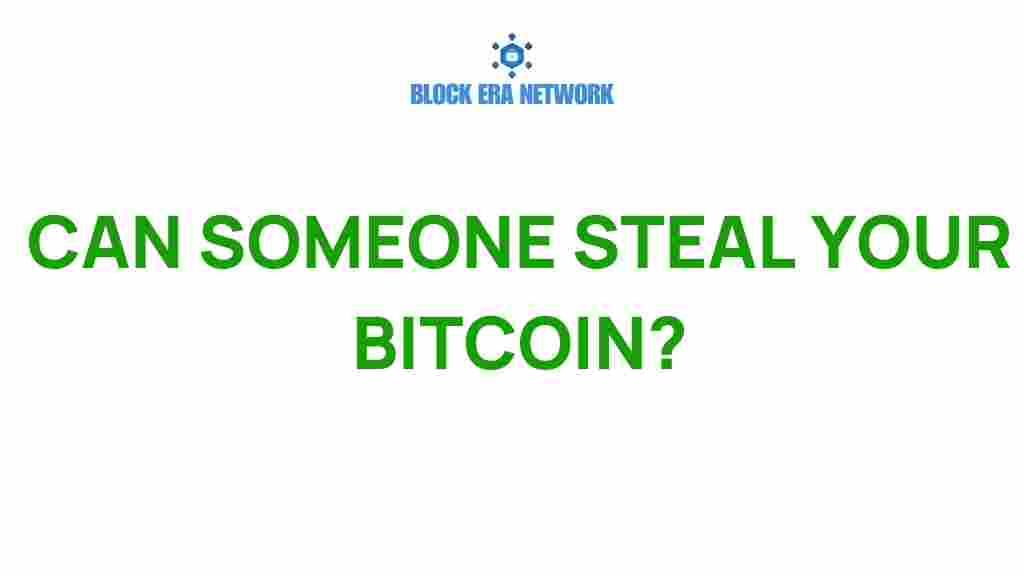Can Someone Really Steal Your Bitcoin? Understanding Bitcoin Theft
The rise of digital currencies, particularly Bitcoin, has transformed the landscape of finance and investment. However, with this innovation comes the looming threat of Bitcoin theft and various forms of cybercrime. Many individuals are concerned about the security of their cryptocurrency holdings, and rightly so. In this article, we will unravel the myths surrounding Bitcoin theft, delve into cryptocurrency security, explore the intricacies of blockchain technology, and provide insights into protecting your digital assets.
Understanding Bitcoin and Blockchain Technology
Before diving into the threats and protection strategies, it’s essential to grasp what Bitcoin and blockchain are. Bitcoin is a decentralized digital currency that operates on a technology known as blockchain. A blockchain is a distributed ledger that records all transactions across a network of computers, ensuring transparency and security.
- Decentralization: Unlike traditional currencies, Bitcoin is not controlled by any central authority.
- Transparency: All transactions are recorded on the blockchain, making them publicly accessible.
- Security: The cryptographic principles behind blockchain technology help secure transactions and prevent tampering.
Common Myths About Bitcoin Theft
Despite the inherent security features of Bitcoin and blockchain, myths about Bitcoin theft persist. Here are some of the most common misconceptions:
- Myth 1: Bitcoin can be hacked easily.
- Myth 2: All Bitcoin exchanges are unsafe.
- Myth 3: Once stolen, Bitcoin is impossible to recover.
While it’s true that Bitcoin theft can occur, understanding how it happens can help mitigate risks. Most thefts happen due to human error, poor wallet safety, or falling victim to scams.
How Bitcoin Theft Occurs
Bitcoin theft typically occurs through several means:
1. Phishing Scams
Cybercriminals often use phishing tactics to trick individuals into revealing their private keys or wallet information. They may send fraudulent emails or create fake websites that mimic legitimate cryptocurrency platforms.
2. Malware
Malware can be used to gain access to your computer or mobile device, allowing hackers to steal your wallet information. This is why maintaining robust online security is crucial.
3. Exchange Hacks
While not all exchanges are unsafe, some have been targeted by hackers due to weak security protocols. Always opt for exchanges with strong security measures.
4. SIM Swapping
In a SIM swapping attack, a hacker convinces a mobile carrier to transfer a victim’s phone number to a new SIM card. Once they gain access, they can reset passwords and steal cryptocurrencies.
Protecting Your Bitcoin: Tips for Enhanced Security
To safeguard your Bitcoin, consider the following tips on crypto protection:
- Use Hardware Wallets: Hardware wallets store your private keys offline, making it much harder for hackers to access your Bitcoin.
- Enable Two-Factor Authentication (2FA): Always enable 2FA on your exchange accounts and wallets for added security.
- Be Wary of Phishing: Always check the URLs of websites and be cautious of unsolicited emails asking for sensitive information.
- Keep Software Updated: Ensure that your wallet software and antivirus programs are up to date to protect against vulnerabilities.
Understanding Wallet Safety
Wallets are crucial for storing your Bitcoin. There are various types of wallets, each with its own level of security:
- Hot Wallets: These are connected to the internet and more susceptible to hacking. Use them for smaller amounts or everyday transactions.
- Cold Wallets: These are offline wallets, such as hardware wallets or paper wallets, providing enhanced security for long-term storage.
For more information on securing your wallets, you can visit this comprehensive guide on wallet safety.
Step-by-Step Guide to Protecting Your Cryptocurrency
Here’s a detailed step-by-step guide to enhancing your cryptocurrency security:
Step 1: Choose the Right Wallet
Decide between a hot wallet and a cold wallet based on your needs. If you plan on trading frequently, a hot wallet may be suitable. For long-term holding, opt for a cold wallet.
Step 2: Enable Security Features
Activate 2FA on all crypto-related accounts. This adds an extra layer of security, making it harder for hackers to gain access.
Step 3: Regularly Update Your Security Software
Ensure your antivirus and anti-malware software are updated regularly to protect against newly discovered vulnerabilities.
Step 4: Backup Your Wallet
Always backup your wallet recovery phrase and private keys in a safe place. This will help you recover your funds in case of theft or loss.
Step 5: Educate Yourself on Scams
Stay informed about the latest scams in the cryptocurrency space. Awareness is your first line of defense against cybercrime.
Troubleshooting Common Security Issues
Even with the best security measures, issues can arise. Here are some troubleshooting tips:
1. If You Suspect a Phishing Attempt
Immediately change your passwords and enable 2FA on all accounts. Report the phishing site to the appropriate authorities.
2. If You Believe Your Wallet Has Been Compromised
Transfer your remaining funds to a new wallet with a new set of private keys. This is crucial to mitigate further losses.
3. If You Experience Unusual Transactions
Check your transaction history regularly. If you notice unauthorized transactions, contact your wallet provider or exchange immediately.
Conclusion: Staying Vigilant in the World of Cryptocurrency
While the decentralized nature of Bitcoin and the security of blockchain technology offer a robust framework for digital currency, Bitcoin theft remains a real threat. By understanding the methods of cybercriminals and implementing strong cryptocurrency security measures, you can protect your digital assets effectively.
Always prioritize wallet safety and stay informed about the latest scams and security practices. The world of cryptocurrency is ever-evolving, and staying vigilant is your best defense against potential threats.
For further resources on securing your digital currency, consider visiting this external resource for in-depth security strategies.
This article is in the category Crypto Security and created by Block Era Network Team
